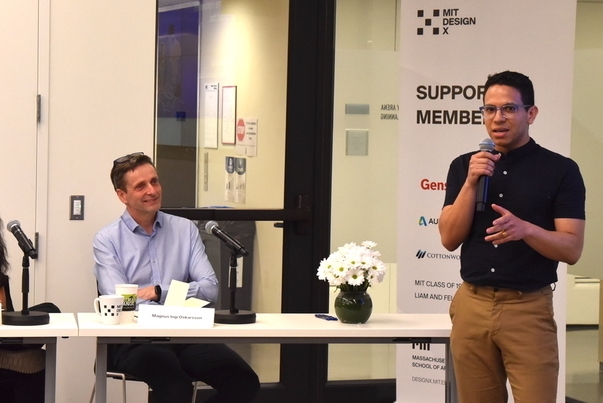
MITdesignX presents ventures from the accelerator's sixth cohort.
Maria Iacobo | School of Architecture and Planning
At the start of the sixth annual MITdesignX “Pitch Day,” Svafa Grönfeldt, the program’s faculty director, made a point of noting that many of the teams about to showcase their ventures had changed direction multiple times on their projects.
“Some of you have pivoted more times than we can count,” Grönfeldt said in her welcoming address. “This makes for a fantastic idea because you have the courage to actually question if your ideas are the right ones. In the true spirit of human-centered design, you actually try to understand the problem before you solve it!”
MITdesignX, a venture accelerator based in the School of Architecture and Planning, is an interdisciplinary academic program operating at the intersection of design, business, and technology. The launching pad for startups focuses on applying design to engage complex problems and discovering high-impact solutions to address critical challenges facing the future of design, cities, and the global environment. The program reflects a new approach to entrepreneurship education, drawing on business theory, design thinking, and entrepreneurial practices.
At this year’s event, 11 teams pitched their ideas before a panel of three judges, an on-site audience, and several hundred viewers watching the livestream event.
“These teams have been working hard on solutions,” Gilad Rosenzweig, executive director of MITdesignX, told the audience. “They’re not designing solutions for people. They’re designing solutions with people.”
Solving urgent problems
Some of the issues addressed by the teams were lack of adequate housing, endangered food supplies, toxic pollution, and threats to democracy. Many of the students were inspired to create their venture because of problems they encountered in their careers or concerns impacting their home countries. The 25 team members in this year’s cohort represent work on five continents.
“We’re very proud of our international representation because we want our impact to be felt outside of Cambridge,” said Rosenzweig. “We want to make an impact around the country and around the world.”
John Devine, a JD/Masters in City Planning (MCP) candidate in the Department of Urban Studies and Planning, created a new software platform, “Civic Atlas.” In his pitch, he explained that having worked in city planning in Texas for a decade before coming to MIT, he saw how difficult it was for communities to wade through and comprehend the dense, technical language in city council agendas. Zoning cases, bond projects, and transportation investments are just some of the significant projects that affect a community, and Devine saw many instances where decisions were being made without community awareness as a result of inadequate communication.
“When communities don’t have access to clear, accessible information, we have poor outcomes,” Devine told the audience. “I realized the solution to this is to make accessible and inclusive digital experiences that really facilitate communication between planners, developers, and members of the community.”
Seizing the opportunity, Devine taught himself how to code and built a fully automated web tool for the Dallas City Planning Commission. The tool checks the city’s website daily and translates documents into interactive maps, allowing residents to view plans in their community. Devine is starting in Dallas, but says that there are more than 800 cities across the United States with a population greater than 50,000 that present an excellent target market for this product.
“I think cities have a ton to gain from working with us, including building trust and communication with constituents — something that’s vital for city halls to function,” says Devine.
Next steps for the cohort
The judges for this year’s event — Yscaira Jimenez, founder of LaborX; Magnus Ingi Oskarsson of Eyrir Venture Management in Reykjavik, Iceland; and Frank Pawlitschek, director, HPI School of Entrepreneurship in Potsdam, Germany — deliberated to identify the best teams based on three criteria: most innovative, greatest impact, and best presentation. The competition was so strong that the judges decided to award two honorable mentions. This year’s awardees are:
- Atacama, a company that is developing biomaterials to replace plastics, received the “Most Innovative” award and $5,000. The company accelerates the adoption of renewable and sustainable materials through machine learning and robotics, ensuring performance, cost-effectiveness, and environmental impact. Its founders are Paloma Gonzalez-Rojas PhD ’21, Jose Tomas Dominguez, and Jose Antonio Gonzalez.
- Grain Box, a startup focusing on optimizing the post-harvest supply chain for smallholder farmers in rural India, was awarded “Greatest Impact” and a $5,000 award. Its founders are Mona Vijaykumar SMArchS ’22 and T.R. (Radha) Radhakrishnan.
- Lamarr.AI, which offers an autonomous solution for rapid building envelope diagnostics using AI and cloud computing, was recognized for “Best Presentation” and awarded $2,500. Its founders are Norhan Bayomi PhD ’22, Tarek Rakha, PhD ’15, and John E. Fernandez ’85, professor and director of the MIT Environmental Solutions Initiative.
- Honorable Mention: “News Detective,” a platform combining moderated, professional fact-checking and AI to fight misinformation on social media, created by rising senior Ilana Strauss.
- Honorable Mention: “La Firme,” which digitizes architectural services to reach families who self-build their homes in Latin America, created by Mora Orensanz MCP ’21, Fiorella Belli Ferro MCP ’21, and rising senior Raul Briceno Brignole.
Following the award ceremony, Rosenzweig told the students that the process was not yet over because MITdesignX faculty and staff would always be available to continue guiding and supporting their journeys as they launch and grow their ventures.
“You’re going to become alumni of MITdesignX,” he said. “You’re going to be joining over 50 teams that are working around the world, making an impact. They’re being recognized as leaders in innovation. They’re being recognized by investors who are helping them make an impact. This is your next step.”
